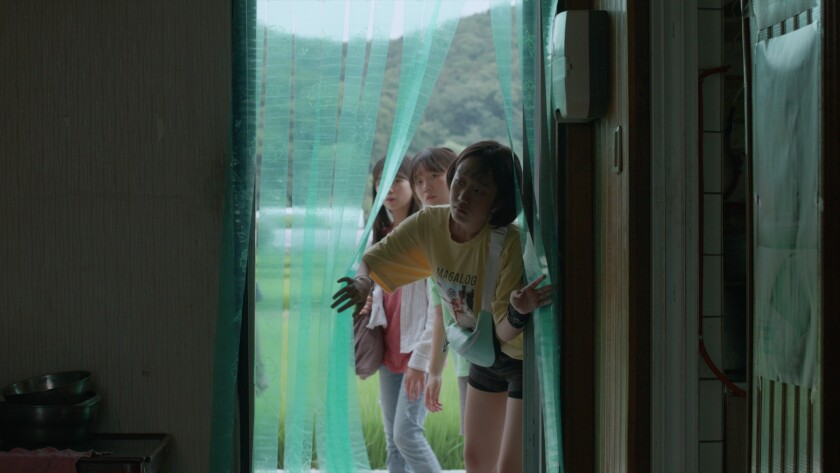Editor-in-chief Tomi Haffety reviews a Korean debut about friendship and identity.
Featured in the Generation KPlus category, debut filmmakers Kwon Min-pro and Seo Hansol are barely out of film school, yet they have taken a shallow plotline and made it into a heart-warming coming of age feature. Set in and around Seoul, this low-budget film was shot with no script, but a basic outline that allows the four actors — all middle-school-aged girls who weren’t renamed, only adding to the organic atmosphere of the feature — to incorporate their natural teenage conversation into the story.
Using 35mm disposable cameras, the girls are given a summer assignment to photograph ‘the end of the world’. This deliberately abstract purpose confuses the girls, who force themselves to complete it only because of a fear of demerits, but they take on the challenge with a youthful sense of ambition and inspiration. Approaching the student photography club, comedically named ‘Shine’ to mock the vice-president’s bald head, Si-yeon is a shy transfer student who quickly becomes comfortable with three girls who seem to be the only other members of the club. Creativity is the key theme of A Short Vacation. The young actresses employ their own narrative and the chemistry between them is not something forced, as it is simply an extension of their own personal lives. In one shot, they sit in a circle discussing the plan for their assignment as So-jung scrolls casually through Instagram — her activity clearly visible from a distance, only adding to the film’s self-identifying realist tone.
The unashamed depiction of modern teenage life makes A Short Vacation feel unique in its portrayal of middle school, and the small cast creates an atmosphere of solidarity between the girls. The endless conversation occurring over the sound of crickets and the rumblings of trains gives the feature an assured Hong Sang-soo feel, and the loose plot gives space for the actresses to fill in the blanks, which they do with skill, not appearing to act at all.

Planning to reach the last stop on the Seoul subway because they think it might show them the end of the world, the girls embark on a formative journey across the city and into the bucolic landscape that surrounds it. Newfound independence is depicted through their attempts at map-reading and their navigation of the complex subway system, with minimalist shots following the group as they become dwarfed by the countryside throughout the day. Throughout the film, the theme of growing up is subtly touched upon, this significant experience an allegory for the challenges they may come to face in adulthood.
Reaching the final station brings disappointment; the girls not finding the void-like black hole they had expected. As they continue along the tracks to find an older subway station that may better fill their wish to photograph the end of the train track, they adapt to the challenges they come to face — running out of phone charge, a sudden rainstorm that only gets worse as they get deeper into the day, the fading sunlight making it difficult to navigate their way back home. The girls end up having to sleep in an abandoned community centre for the night, but what could have unfolded into a sinister night turns into a wholesome sleepover where the relationships between the group are explored in more depth. As the night goes on, deeper conversations ensue, adding another layer to the so-far surface-level dialogue. Discussing identity, their personal history and family deaths keeps the girls awake until the small hours with only a lamp providing a comforting orange glow to the bedroom. Again, they engage their innocent curiosity but this time through detailing their own lived experiences in a convivial and comfortable conversation. Realising that three of them have visited the same Korean War memorials to visit their grandfather’s graves, they become excitable in the knowledge that their friendship has a longer history than they first thought, and this is indicative of the many layers to the human relationships we all old.
A domestic realist film would not be complete if it was not brimming with scenes of sharing food and conversations about it. There are multiple scenes when the girls share a meal and it is through this depiction of reality that the equality between each girl is shown best. No power dynamic underlies the friendship, and each job they undertake is completely egalitarian as everyone discusses the most tactical next move. Truly a film of friendship and solidarity, A Short Vacation proves its impact as a quality feature debut in only eighty minutes. The nostalgic atmosphere brings depth to the unambiguous friendships of adolescence, and it is only once the film closes that it becomes clear that the destination was not the goal of the project, but the journey.




